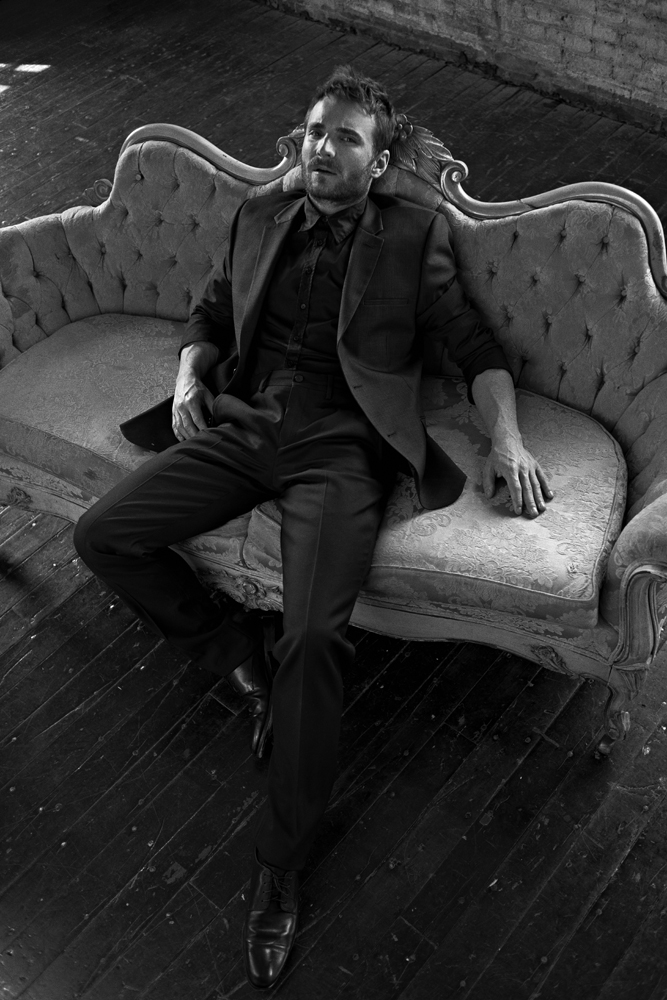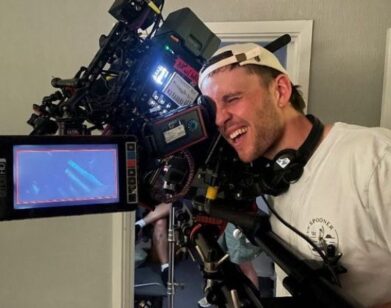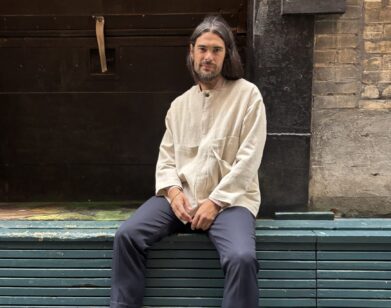Discovery: Martin McCann
MARTIN MCCANN IN BROOKLYN, NEW YORK, APRIL 2015. PHOTOS: ARKAN ZAKHAROV. STYLING: KATIE BURNETT. GROOMING: SIMONE OTIS FOR JED ROOT. STYLING ASSISTANT: LAUREN PIVEN.
The Earth has run out of oil and society has disintegrated. A man, played by Irish actor Martin McCann, lives in a cabin in the woods with a small garden for sustenance. He is solitary and joyless. His past life is fading—a few crumpled photographs and a nightmare of a memory—and he’s not fighting it. Then, a mother (a silver-haired Olwen Fouere) and her 17-year-old daughter (Mia Goth) beg him for shelter he cannot afford.
The first feature-length film from writer-director Stephen Fingleton, The Survivalist is bleak and gruesome. It is affecting because it is uncomfortably close. Stripped of a musical soundtrack, special effects, and, in one notable scene, camera cuts, there is nothing to shield the audience. It takes a remarkable actor to hold the audience’s attention under such circumstances, but McCann succeeds.
Over the last 10 years, McCann has quietly built a career for himself in the U.K. His first film was Richard Attenborough’s Closing the Ring in 2007 with Shirley MacLaine and Christopher Plummer. The 31-year-old played a Texan soldier in Steven Spielberg’s mini-series The Pacific, and a violent Irish Republican in ’71. He counted the late Pete Postlethwaite, a frequent co-star, as his mentor. Currently, McCann is filming Kurt Sutter’s new pilot, The Bastard Executioner, with Matthew Rhys, Katey Sagal, and Stephen Moyer. “Imagine a Sons of Anarchy-level of violence and darkness,” he tells us, “but set in medieval northern England.”
AGE: 31
HOMETOWN: Belfast, Northern Ireland
AROUND THE NEIGHBORHOOD: I grew up in Divis Flats. It was a poor neighborhood, a poor background. There were a lot of troubles around at the time. From the outside that looks like, “Well, what was that like?” But when you’re a kid growing up in a situation like that, you don’t grow up thinking, “Oh my god, this is a really difficult situation” because you have nothing to compare it to. If I had grown up in a really lovely neighborhood and then moved to Divis Flats, I probably would have been pretty pissed off. [laughs] But I didn’t. That area and that neighborhood was all I ever knew. I can say that I had a decently happy childhood. We didn’t have any money and we lived in sort of squashed boxes and it wasn’t aesthetically pretty—not in the slightest—but you make the best of it.
INTRODUCTION TO ACTING: My escapism would be mimicking my favorite actors and doing lines from different shows. I had an averagely good impression of everyone. I loved mimicking Robert De Niro, Jack Nicholson, all the typical guys. I was one of those annoying kids that would quote lines from Ace Ventura. As embarrassing as it is to say, I found it very funny when I was a kid. That’s how I fell into [acting], I guess. My mum thought that maybe I had an interest in it, and she sent me out and put me into what’s called a black taxi—they run up and down the Falls Road in Belfast. The taxi took me down into the city center to an amateur drama group called the Rainbow Factory, where they took Protestant and Catholic kids from a Northern Irish background and brought them together through drama. That was my first experience with acting and I thought, “I could do this forever.” And I’ve done it ever since.
FIRST ROLES: Bugsy Malone and the Artful Dodger. They were my first two plays. I was a little cheeky chap—I always got the cheeky chappy roles.
THE SURVIVALIST: I first met Stephen Fingleton at the Galway Film Festival in Ireland. I got chatting to him and then he mentioned his short film Magpie, which was kind of a precursor to The Survivalist. He had mentioned an interest in casting me as one of the actors in Magpie. I had a look at Stephen’s [short] film SLR and absolutely loved it; I thought he was a great talent. I don’t think he ever planned to cast me in The Survivalist, but when I worked with him on Magpie I kind of coaxed him into giving me the role. I think there were plans to put a well-known name as The Survivalist initially. I can’t really mention names, but they had planned to go with someone that was a lot more known.
A FEARFUL FUTURE: The Survivalist is one of the best scripts—if not the best script—that I’ve read, certainly the best script that I’ve been a part of. It painted the world so brilliantly. There wasn’t a lot of dialogue—it focused on the beats and the nuances and the world and the actions that happened in that world. I think it was so clever that Stephen didn’t resort to doing a montage to explain the fact that the world had decreased in population and the oil reserves had run out. He did it very cleverly by two lines and a graph. That’s minimalism at its best. The script is violent, yes, but it’s violent in the sense that the situation these people are in is violent in itself. The actual violent actions, they don’t come as any surprise. This isn’t a comedy, this is a bare bones, truthful take on what might happen if, and when, the energy sources run out on the planet.
WHAT’S IN A NAME: All I was focused on was my brother’s name in the film, and if you watch the film you’ll know why. I didn’t think it was important for me to know my character’s name because I think he’d given up his name a long time ago. This was a guy that had changed his identity in so many ways and lost his identity in so many ways that giving him a name as an actor wasn’t important for me.
REMEMBERING PETE POSTLETHWAITE: He wouldn’t give me any sort of one-line pieces of wisdom or advice, but he would always run through scenarios. He told me that in In the Name of the Father, Daniel Day Lewis completely took a different approach to one of the scenes and Pete acted the scene out for me. He said, “What Daniel did was the difference between screen acting and good film acting.” He had a great sense of humor—a wicked sense of humor. There’s a famous quote from Steven Spielberg, he says, “Pete Postlethwaite is probably the best actor in the world.” And when people asked Pete about that quote he said, “No no, you’ve got it all wrong. What Steven Spielberg said is, ‘Pete thinks he’s one of the best actors in the world.'” Whenever someone gave him a compliment he would take it with such humility. He was one of the most humble men that I’ve ever met in my life and he just so happened to be one of the most talented men I’ve ever met in my life.
UP NEXT: I like independent film. You get that one-on-one personal connection with the director; you get to build character with the director. You’re usually up against it because sometimes the budget isn’t there, but the love is there and the passion is there. Independent film, with great actors and great directors and great producers, is where I would love my career to go.
THE SURVIVALIST PREMIERED EARLIER THIS MONTH AT THE TRIBECA FILM FESTIVAL IN NEW YORK.







